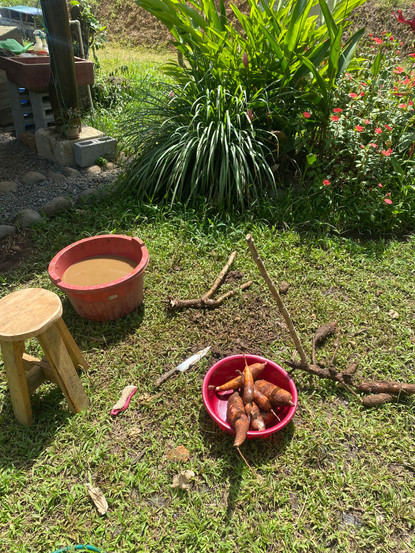COSTA RICA: Finca La Quimera
- James Braham

- Nov 16, 2022
- 5 min read
Updated: Nov 20, 2022
A day in the life of a volunteer on a permaculture farm in Costa Rica
🎵 Song recommendation whilst reading: Ta promesse - Amadou & Mariam
The month of September is one that will be cherished for as long as I breathe. Finca La Quimera is a haven that has been moulded by Alba with the utmost respect for nature whilst practising sustainable ways of living. In the jungle of central Costa Rica, near the small community of Jicotea, lies this serene Finca (the Spanish word that refers to farm).
I spent 31 unrivalled days on this piece of land — an 8-hectare property, with most of it still being untouched by human interference. The closest form of civilisation nearby is a hamlet called Jicotea, which has an extremely small population. The hamlet ends at the bus stop which is situated at the bottom of a relatively steep hill. If one were to travel up this hill to its peak, one would stumble upon the turn-off for Finca La Quimera. This gravel road descends towards the central hub of the Finca, where one can find the communal area which consists of an outdoor kitchen, workshop, reading area, and Alba's cabin. So, you might be wondering who Alba is.
Alba is a 40-year-old woman who owns and runs the Finca. She is originally from northern Spain and used to be an air hostess for Iberia, culminating over a 15-year period. She did multiple trips to Costa Rica due to her line of work, until one day she decided that she would save up enough money to buy some land for a permaculture project in the country. In order to save up she had to work extremely hard and that's precisely what she did; Finca La Quimera was born. I must mention that she was just over seven months pregnant when I first arrived, in September, and has since given birth to her beautiful daughter. The perception of life can be beautiful when you come across people like Alba.
The Day-to-Day
A typical day on the Finca went something like this...

The volunteers would wake up anytime between 5 am and 6 am, depending on the individual's preference. We would then meditate or read before meeting up by the outdoor kitchen at 6:30 am. As you'd approach the kitchen, you would witness Alba already getting the outdoor wood-burning stove going. Breakfast. We would all take on some cooking roles as a team, preparing a big, healthy meal that would sustain us for the morning's work! For example, banana and oat pancakes; scrambled eggs mixed with red onion, tomato, and garlic; fresh fruit like papaya, passion fruit, and pineapple; toasted homemade bread; and pico de gallo. Only one more critical part of the breakfast routine, making a delicious pot of coffee!
By 8 o'clock, we would have cooked, eaten, washed up, and been ready to begin work. We had a blackboard that had weekly duties that were distributed between the volunteers. These duties were on top of the daily jobs that Alba would brief us on. We would work for about an hour and a half/two hours, then take a coffee break. This was followed by work for another 3 hours until around 1/1:30 pm. However, at 12 pm, two people would stop the work that they were busy with and be on lunch duty for that day. It may seem like a short work day but one has to factor in the heat and humidity that you'd experience in this tropical climate, as well as the actual physical labour that you were doing. Believe me, my shirts reached saturated levels that were not known to me. It was all worth it when you reminded yourself of where you were and what you were doing in the world at that moment.
What would some of these jobs include? Well, one would involve carpentry because we were helping build a new cabin so that Alba's parents could come and stay when the baby was born. Two guys (Douglas from Nicaragua and Nico from Costa Rica) worked daily on the Finca, and for the month that I was there, they had the responsibility of building the new cabin. Another job was tending to the 102 coffee plants that had recently been planted a few months beforehand. This involved fertilising and weeding around them, ensuring no foreign roots were affecting their growth. One aspect involved harvesting yuca, plantains, bananas, and anything ready to be harvested from the vegetable garden terraces. We also experienced the process of making a microorganism solution that could be used as a natural herbicide to help maintain ultimate growth. Additionally, a garlic and pepper solution was also used to fight-off ants that were destroying progress. Trails had to be kept in shape or made, so we used machetes and shovels to maintain or create them. We went down to the river to pick up stones that would be used to help build a cover for two parking spaces. We made wooden steps for paths in and around the coffee and banana plants. Our inner artistry came out as wooden signs were crafted for specific areas around the farm such as a sign directing one towards the river or a sign that had a wholesome Spanish phrase on it. Other jobs to mention include feeding the 7 chickens and cleaning the mulching area where they laid their eggs, composting, and planting baby vegetables.
After we had finished work and eaten lunch (Douglas and Nico would often join us), we had the rest of the day to ourselves. We would head back to our graceful volunteer cabin and have a peaceful afternoon. One could have an outdoor shower after a sweaty day's work and even take it in the rain, due to afternoon showers being a common phenomenon in the Caribbean climate. Most of our time off was a chance to reflect, read, journal, and chat with each other. You could sit on the makeshift couch made from wooden pallets, or you could lie in one of the two hammocks. You could watch nature as the birds and the butterflies fluttered in and amongst the greenery that surrounded us. You could sleep. Whatever you did that afternoon, it was always peaceful. At dusk, we would gather as volunteers to do our daily exercise routine, followed by someone leading a yoga session. We would make our way back to the outdoor kitchen to cook something for dinner or have some leftovers from lunch. It was normally always brief and involved a lot of card games. You would then head back to the cabin, read and journal some more. Eventually, one would call it a night (as early as 8 pm but no later than 9 pm) and head to bed.

The volunteer cabin
That was the norm. Honest and rewarding work. Nothing produced on the farm is sold anywhere; it is intended to be produced on the Finca for the Finca (and maybe a neighbour or two!). To have spent a month off-grid with no electricity, surrounded by nature, learning Spanish, practising permaculture farming, swimming in the river, reading, journaling, exercising, and sleeping; this was an experience like no other...I am thankful for platforms such as WWOOF (World Wide Opportunities on Organic Farms) for presenting the opportunity to me to find Finca La Quimera. More so, I am eternally grateful for Alba and this intrinsic project that she continues to pursue. I highly recommend opportunities such as this to those who are wanting to learn about permaculture farming whilst giving back to nature and the surrounding community.
"Todo lo que recibe atención crece" - That which receives attention will grow (Spanish saying)
Pura Vida!
(Costa Rican saying and way of life; 'pure life')





























Comments